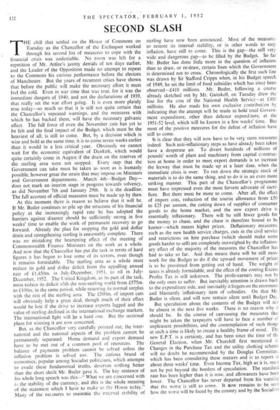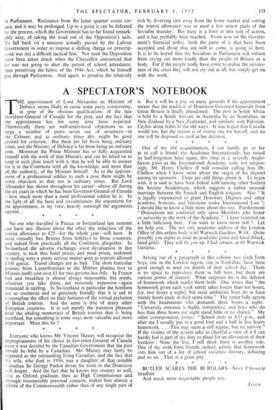SECOND SLASH
THE chill that settled on the House of Commons on Tuesday as the Chancellor of the Exchequer worked through his second list of measures to cope with the financial crisis was undeniable. No room was left for a repetition of Mr. Attlee's jaunty denials of ten days earlier,. and the Leader of the Opposition made no attempt to repeat to the Commons his curious performance before the electors of Manchester. But the years of recurrent crises have shown that before the public will make the necessary effort it must feel the cold. Even in war time that was true, for it was the immediate dangers of 1940, and not the declarations of 1939, that really set the war effort going. It is even more plainly true today—so much so that it is still not quite certain that the Chancellor's repeated warnings, and the measures with which he has backed them, will have the necessary galvanic effect. The full force of even the November cuts has yet to be felt and the final impact of the Budget, which must be the heaviest of all, is still to come. But, by a decision which is wise and bold at the same time, it is to come seven weeks earlier than it would in a less critical year. Obviously we cannot wait for the economic equivalent of Dunkirk, which would quite certainly come in August if the drain on the reserves of the sterling area were not stopped. Every step that the Government can take must be taken as soon as is humanly possible, however great the strain that may impose on Ministers and Government departments. March 4th—Budget Day— does not mark an interim stage in progress towards solvency, as did November 7th and January 29th. It is the deadline. The full account of official measures must be made up by then.
At this moment there is reason to believe that it will be. If Mr. Butler continues to pile up the structure of his financial policy at the increasingly rapid rate he has adopted the barriers against disaster should be sufficiently strong in five weeks' time to enable the work of permanent recovery to go forward. Already the plan for stopping the gold and dollar drain and strengthening sterling is reasonably complete. There was no mistaking the heartening effect of the meeting of Commonwealth Finance Ministers on the work as a whole. And now that the Chancellor has put the task in terms of hard figures it has begun to lose some of its terrors, even though it remains formidable. The sterling area as a whole must reduce its gold and dollar deficit from the appalling annual rate of £1,450m. in July-December, 1951, to nil in July- D:.cember, 1952. The United Kingdom, as its part of the task, must reduce its deficit v.oith the non-sterling world from £575m. to £100m. in the same period, while restoring its normal surplus with the rest of the sterling area. The £500m. of import cuts will obviously help a great deal, though much of their effect would be lost 'if the drive to increase exports lagged and the value of sterling declined in the international exchange markets. The international fight will le a hard one. But the sectional plans for winning it are now concerted.
But, as the Chancellor very carefully pointed out, the inter- national and the national aspects of the problem cannot be permanently separated. Home demand and export demand have to be met out of a common pool of resources. The balance of payments problem cannot be solved unless the inflation problem is solved too. The curious brand of economics, popular among Socialist politicians, which attempts to evade these fundamental truths, deserves nothing better than the short shrift Mr. Butler gave it. The key sentence of his whole long speech was this—" What we are concerned with i 3 the stability of the currency, and this is the whole meaning of the statement which I have to make to the House today." Many of the meisures to maintain the external stability of sterling have now been announced. Most of the measures to restore its internal stability, or in other words to stop inflation, have still to come. This is the gap—the still very wide and dangerous gap—to be filled by the Budget. So far Mr. Butler has done little more in the question of inflation than to draw, or re-draw, certain lines which the Government is determined not to cross. Chronologically the first such line was drawn by Sir Stafford Cripps when, in his Budget speech of 1949, he set the limit of food subsidies which has since been observed—£410 millions. Mr. Butler, following a course already sketched out by Mr. Gaitskell, on Tuesday drew the line for the cost of the National Health Service—at £400 millions. He also made his own exclusive contribution by indicating that the attempt will be made to hold total Govern- ment expenditure, other than defence expenditure, at the 1951-52 level, which will be known in a few weeks' time. But most of the positive measures for the defeat of inflation have still to come.
It is clear that they will now have to be very stern measures indeed. Such anti-inflationary steps as have already been taken have a desperate air. To divert hundreds of millions of pounds' worth of plant and machinery from capital construc- tion at home in order to meet export demands is to increase the leeway that must be made up at a later date, when the immediate crisis is over. To run down the strategic stock of materials is to do the same thing, and to do it in an even more striking manner. This part of the Chancellor's programme must have impressed even the most fervent advocate of sacri- fices. But there must be more to come. After all, the effect of import cuts, reduction of the tourist allowance from £50 to £25 per annum, the cutting down of supplies of consumer goods to the home market, and the new export drive is essentially inflationary. There will be still fewer goods for the money to chase, and the chase is therefore bound to be keener—which means higher prices. Deflationary measures, such as the new health service charges, cuts in the civil service and restrictions on hire purchase (which should make some goods harder to sell) are completely outweighed by the inflation- ary effect of the majority of the measures the Chancellor has had to take so far. And that means there will be still more work for the Budget to do if the upward movement of prices is to be prevented from getting out of hand. The weight of taxes is already formidable, and the effect of the coming Excess Profits Tax is still unknown. The profit-earners may not be the only ones to suffer. But inevitably attention is drawn back to the expenditure side, and inevitably it lingers on the enormous and blantantly inflationary item of subsidies. On that Mr.
Butler is silent, and will now remain silent until Budget Day.
But speculation about the contents of the Budget will not be absent in the next five weeks. There is no reason why it should be. In the course of canvassing the measures that might be taken the taxpayers will have to face a number of unpleasant possibilities, and the contemplation of such things at such a time is likely to create a healthy frame of mind. The new E.P.T. is a certainty, and has been since the time of the General Election, when Mr. Churchill first mentioned it. Changes in the Purchase Tax and the utility clothing' scheme will no doubt be recommended by the Douglas Committee, which has been considering these matters and is to report in about three weeks' time. Even Income Tax, high as it is, must not be put beyond the borders of speculation. The standard rate has been higher than it is now, and allowances have been lower. The Chancellor has never departed from his warning that the worst is still to come. It now remains to be seen how the worst will be faced by the country and by the Socialists in Parliament. Resistance from the latter quarter seems cer- tain, and it may be prolonged. Up to a point it can be defeated by the process, which the Government has so far found remark- ably easy, of taking the wind out of the Opposition's sails. To fall back on a measure actually passed by the Labour Government in order to impose a shilling charge on prescrip- tions was not a difficult tactical feat. Nor need the Opposition have been taken aback when the Chancellor announced that be was not going to alter the period of school attendance, thus preserving the fabric of the 1944 Act, which he himself put through Parliament. And again, to penalise the relatively rich by diverting cars away from the home market and cutting the tourist allowance was to steal a few minor peals of the Socialist thunder. But there is a limit to this sort of action, and it has probably been reached. From now on the Govern- ment's financial policy, both the parts of it that have been accepted and those that are still to come, is going to hurt. It is to be hoped that the Socialists in Parliament will refrain from crying out more loudly than the people of Britain as a body. For if the people really have come to realise the serious- ness of the crisis they will not cry out at all, but simply get on with the work.



































 Previous page
Previous page